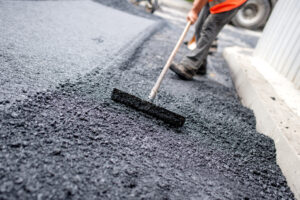Maintaining a clean and well-kept asphalt driveway not only enhances your property’s curb appeal but also extends the lifespan of the pavement. Whether you’re dealing with stubborn oil stains, moss growth, or surface debris, knowing how to clean asphalt driveways effectively is essential for preserving their functionality and appearance. In this blog post, we’ll guide you through the best techniques and tools to restore your driveway to its pristine condition. From simple DIY methods to professional-grade solutions, discover the steps you need to take to keep your asphalt driveway looking its best year-round.
10 Tips On How To Clean Asphalt Driveways
1. Regular Street Sweeping
When dirt builds up in asphalt dips and cracks, a few different things can happen. First, more dirt and debris can get caught, allowing plants to grow in cracks. Plant roots lead to more cracks in the pavement. Unsealed asphalt cracks invite water and breed potholes.
Letting debris build up on asphalt pavement also invites pests, which can be costly to eradicate.
2. Pressure Washing Asphalt Driveways
Depending on the size of your driveway, hiring an asphalt cleaning company may not be feasible. If this is the case, you still need to clear the pavement of dirt and debris that threaten to cause future issues.
It’s best to start by spraying off your driveway with a garden hose. In some circumstances, high-pressure power washing is a good idea, but not when there are stains. A high-powered nozzle like a pressure washer can push the contaminants deeper into small voids and cracks, making them hard to remove.
Additionally, it’s best to follow-up any pressure washing with asphalt sealcoating. Newly cleaned-out voids may be prompted to form cracks. Sealcoating adds more aggregate to these newly emptied voids. It also seals the surface, protecting your asphalt from water and other threats.
3. Fresher Oil Stains are Easier to Clean
Oil has detrimental effects on asphalt, causing it to break down. As with most things, the longer oil stains on asphalt are left to themselves, the harder they are to clean. It is always best to regularly keep an eye out for oil stains and take early steps to fix them.
4. How to Remove Oil from Asphalt
Oil stains on driveway asphalt require a cleaning agent and some elbow grease to keep them from having lasting, deteriorating effects.
If you have oil stains on your driveway, before cleaning, you need to soak up excess oil. This is commonly done with sawdust, baking soda, or kitty litter. Whichever product you choose, you should let it sit on the stain for a while and to absorb the oil. Then it can be swept up and disposed of.
Next, a cleaning agent should be applied to set-in oil stains. Commonly used are Simple Green, Coca-Cola, biodegradable oven cleaner. Apply it to the stain and let it sit. If necessary, you may need to scrub with a stiff brush.
5. Be Careful with Wire Brushes
Depending on the stain and its severity, you may be forced to apply some elbow grease with a scrub brush to coax out determined stains. Try to avoid overusing strong wire brushes. These can be harmful, removing more than caked-on oil, but also your asphalt sealant and precious aggregate.
6. Don’t Use Solvents on Your Driveway Stain
Carefully choose which cleaning product you are applying to your driveway. The use of any solvents will hurt more than they help. Solvents include paint thinner, turpentine, rug cleaner, drain cleaner, and acetone. These can damage asphalt, reacting with its petroleum base and making it softer.
7. Dealing with Stains from Decaying Leaves and Mulch
Letting old leaves sit too long on your driveway can cause brownish-colored stains. To get rid of stains left by decaying leaves, rinse the stain and apply soap or vinegar to the surface with a sturdy bristle brush.
8. Clean Asphalt Stains Before Winter
If you wait to clean asphalt stains until the cold winter months, your actions can have detrimental effects. Water expands as it freezes. If water is applied to your driveway and it gets into even the smallest cracks. you run the risk of causing more cracks and other asphalt damage. Additionally, frozen-on asphalt stains can be much harder to clean.
9. Cleaning Asphalt Rust Stains
If your asphalt is faded, rust stains can be a significant eyesore. Asphalt cleaning goes beyond using a garden hose to remove these persistent marks. For more recent stains on your asphalt, cleaning can be effectively done using natural cleaners such as lemon juice and vinegar. However, more stubborn rust stains on the asphalt may require cleaning chemicals like trisodium phosphate or oxalic acid, which are commonly available at hardware stores.
10. Sealcoat to Protect from Asphalt Stains
The best protection from future stains is sealcoating. This process protects your asphalt driveway with a thin coat of asphalt sealer. The covered asphalt surface repels water and protects against oil stains.
It’s not a good idea to simply add sealcoating on top of an asphalt stain. Cleaning the asphalt has to come first. If you put an asphalt sealer over an oil stain, the “seal” will not work properly. Stains can corrode the sealant from underneath.
Read More: How Often Should You Sealcoat Your Driveway?
Expert Asphalt Maintenance in the West
If you need advice about stains on your driveway, our asphalt experts can help with more than just cleaning tips. Superior Asphalt, LC provides asphalt maintenance services in Utah, Nevada, Colorado, Wyoming, and Arizona. Contact us today!
FAQs
Will Vinegar Damage Asphalt Driveways?
No, vinegar will not damage your asphalt driveway. It makes for a great DIY cleaning agent for asphalt driveways.
How do I Remove Oil Stains from my Asphalt Driveway?
To remove oil stains from an asphalt driveway, soak up the excess oil, then use a cleaning agent. You can use something like Simple Green, baking soda and water, or a biodegradable oven cleaner.
How do I Remove Rust Stains from my Asphalt Driveway?
For more recent stains on your asphalt, you can use natural cleaners such as lemon juice and vinegar. However, more stubborn rust stains on the asphalt may require cleaning chemicals, like trisodium phosphate or oxalic acid.



